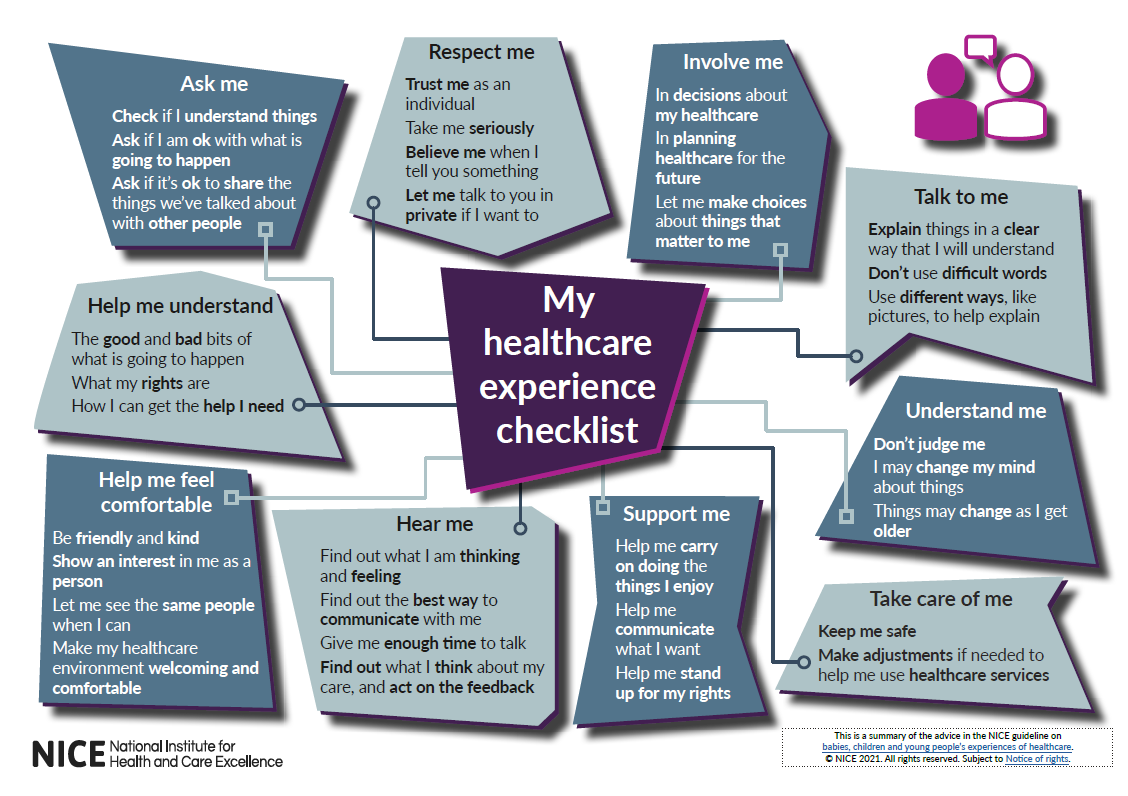Overview
This guideline describes good patient experience for babies, children and young people, and makes recommendations on how it can be delivered. It aims to make sure that all babies, children and young people using NHS services have the best possible experience of care. It is recognised that parents and carers play a key role, and where appropriate, we took their views into account when developing the recommendations.
The recommendations in this guideline apply to all healthcare experiences, but for some babies, children and young people, interaction with healthcare services will be less frequent (for example, visits to a dentist or GP), while for others interactions will be frequent or ongoing (for example, inpatient stays), so a personalised approach to implementation is needed.
Although the guideline use the terms babies, children and young people, the Children Act 1989 defines a child as “a person under the age of eighteen” and therefore the Act applies to the entire population covered by this guideline, regardless of the terms used within the recommendations.
NICE has also produced a guideline on patient experience in adult NHS services for people aged 18 and over.
Recommendations
This guideline includes recommendations on:
- overarching principles of care
- communication and information
- planning healthcare
- consent, privacy and confidentiality
- advocacy and support
- improving healthcare experience, including healthcare environments
- accessibility, continuity and coordination
Who is it for?
- Healthcare professionals, commissioners and providers of NHS or local authority healthcare services
- Non-clinical staff who come into contact with patients (for example, receptionists, clerical staff and domestic staff)
- People aged 17 and under using healthcare services, their families and carers, and members of the public
Guideline development process
How we develop NICE guidelines
This guideline was commissioned by NICE and developed in partnership with the Royal College of Obstetricians and Gynaecologists (RCOG).
Your responsibility
The recommendations in this guideline represent the view of NICE, arrived at after careful consideration of the evidence available. When exercising their judgement, professionals and practitioners are expected to take this guideline fully into account, alongside the individual needs, preferences and values of their patients or the people using their service. It is not mandatory to apply the recommendations, and the guideline does not override the responsibility to make decisions appropriate to the circumstances of the individual, in consultation with them and their families and carers or guardian.
All problems (adverse events) related to a medicine or medical device used for treatment or in a procedure should be reported to the Medicines and Healthcare products Regulatory Agency using the Yellow Card Scheme.
Local commissioners and providers of healthcare have a responsibility to enable the guideline to be applied when individual professionals and people using services wish to use it. They should do so in the context of local and national priorities for funding and developing services, and in light of their duties to have due regard to the need to eliminate unlawful discrimination, to advance equality of opportunity and to reduce health inequalities. Nothing in this guideline should be interpreted in a way that would be inconsistent with complying with those duties.
Commissioners and providers have a responsibility to promote an environmentally sustainable health and care system and should assess and reduce the environmental impact of implementing NICE recommendations wherever possible.
